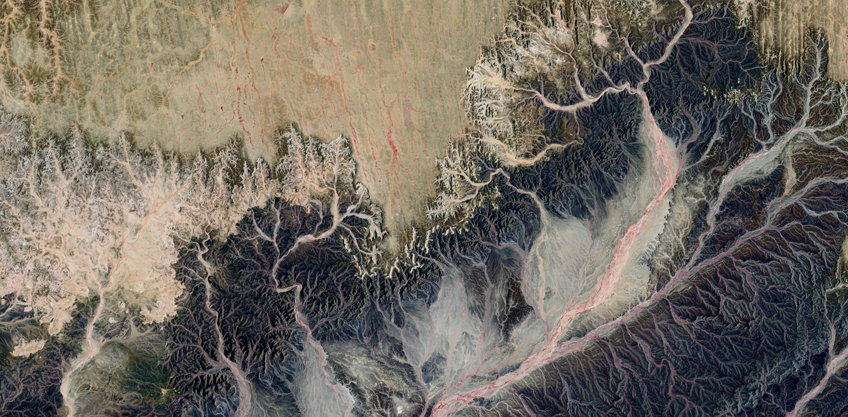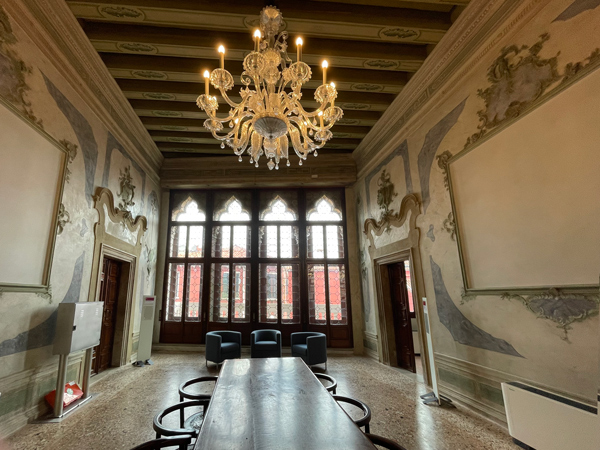Research
NICHE is a cooperative, interdisciplinary, experimental Research Center. Drawing on the humanities, humanistic social sciences, and the arts, NICHE aims to address the urgent social and cultural challenges posed both globally and locally by the current and unprecedented environmental crisis, which is also a crisis of the imagination.

Research Themes/Focus
- Environmental Humanities
- Blue Humanities
- The Future of Food and Water
- Venice as an Object of Study
- Venice as a Point of Observation on Global Environmental Issues
- Human Beings and the Environment: Non-Western Points of View
- Ecological Art Practices
- Environmental Crisis, Inequalities and Migration
- Citizen Science
- Ecological Democracy
Research Clusters
Buddhism and Ecology
Principal Investigators Francesca Tarocco
By critically examining Buddhist-inspired worldviews that saw human beings as an integral partof a cosmos dominated by nature, this cluster explores the interplay of Buddhism and the environment in Asia and beyond. It also examines Buddhist representations of nonhuman animals and human-animal relations, non-human actants, artifacts, hermeneutics textual forms, infrastructures, as well as Buddhist-inspired technology, in the sense of an application of knowledge that connects us inter-subjectively with the material world.
Affiliated members
Saskia Abrahms-Kavunenko
University of Copenhagen
Silvia Francescon
UBI, NICHE Fellow
Jeffrey Nicolaisen
NYCU, National Yang Ming Chiao Tung University
Luca Maria Olivieri
Ca' Foscari University of Venice
Silvia Rivadossi
Ca' Foscari University of Venice
Amalia Rossi
NABA - Nuova Accademia di Belle Arti, NICHE fellow
Jacopo Scarin
Ca' Foscari University of Venice
Edoardo Siani
Ca' Foscari University of Venice
Ronit Yoeli-Tlalim
Goldsmiths, University of London
(Ben) Weilun Zhang
University of Minnesota
Energy Humanities
Principal Investigator Enrica De Cian and Antonella Mazzone
This research cluster examines people's energy habits, behaviors, and traditions and their broad implications for society and the environment. It aims to uncover the role of society, values, and culture with mixed-method approaches that place humans and their interactions with space, culture, and society at the center.
Affiliated members
Daniela Del Bene
Institute of Environmental Science and Technology (ICTA) at the Autonomous University of Barcelona (UAB)
Giacomo Falchetta
Fondazione Centro Euro-Mediterraneo sui Cambiamenti Climatici
Antonella Mazzone
University of Oxford
Political Ecology and Eco-linguistics
Principal Investigator Daniele Brombal
The goal of the cluster is to enable alternative political ecologies by unearthing the transformative potential of language. The PI regards area studies as a meaningful platform to research and redefine values, world-views, and institutions shaping social-ecological systems.
Affiliated members
Sergio Conti
Università degli Studi Roma Tre
Daniela Del Bene
Institute of Environmental Science and Technology (ICTA) at the Autonomous University of Barcelona (UAB)
Solutions
Principal Investigators Steen Rasmussen and Massimo Warglien
Living artifacts, i.e. artifacts that have livingness and growth as a defining property, challenge our conventional view of the role of human and non-human agency in shaping the material environment in which we live. In this Research Cluster we will combine multiple research strategies, from ethnography to computational modeling, to explore the nature of living artefacts and the implications for the design of innovative, sustainable solutions to key environmental challenges.
Affiliated members
Stefan Lorenzmeier
Universität Augsburg
Technoscience and Justice in Multispecies Worlds
Principal Investigator Roberta Raffaetà
This cluster mainly draws from the ERC project HealthXCross’s research and activities, extending beyond it. Core topic of the cluster is how to live well in an entangled and multispecies world. Key questions refer to what ‘living well’ means in its connection to social justice and in times of ecological transition, and how technoscience articulates it. The methods of inquiry are mainly anthropological, in strong alliance with other disciplines.
Affiliated members
Tanja Ahlin
University of Amsterdam
Silvia Bagni
Università di Bologna
Lucilla Barchetta
Ca' Foscari University of Venice
Giorgio Brocco
Univeristy of Wien
Corinna Guerzoni
University of Bologna
Hannah Landecker
UCLA Department of Sociology
Maurizio Meloni
Deakin University
Nicola Manghi
EHESS-CREDO
Gabriele Orlandi
Ca' Foscari University of Venice
Marta Scaglioni
Ca' Foscari University of Venice
Victor Secco
Ca' Foscari University of Venice
Sabrina Tamburini
Ca' Foscari University of Venice
Francois Thoreau
Université de Liège
Federica Timeto
Ca' Foscari University of Venice
Ecological Art Practices
Principal Investigator Cristina Baldacci
The research cluster Ecological Art Practices questions the relationship between art and the environment intertwining ecocritical approaches, radical imagination and creative sustainability. It focuses on environmental concerns related to anthropogenic climate change on a local (Venice) and global level, by examining the challenges and possibilities of art practices, as well as of art histories and theories, and of natural and cultural archives. Water as a medium, a metaphor, a space for action and (social, cultural, biological) diversity is a core topic. The cluster aims both to create inclusive occasions for interdisciplinary exchange – among scholars and cultural practitioners working across the field of contemporary art practice and theory – and to foster international collaborations with (art) research centers and commons.
Affiliated members
Giovanni Aloi
School of the Art Institute of Chicago / Antennae: The Journal of Nature in Visual Culture
Giorgio Andreotta Calò
Artist, Venice Academy of Fine Arts
Martina Angelotti
ON (Bologna) / Fondazione Antonio Ratti (Como)
Valeria Burgio
Ca' Foscari University of Venice
Angelika Burtscher
Lungomare (Bozen)
Andrea Conte
Artist and Environmental Engineer, PhD
Andreco Studio and Climate Art Project
Marco Dalla Gassa
Ca' Foscari University of Venice
T.J. Demos
University of California, Santa Cruz / Center for Creative Ecologies
Susanne Franco
Ca' Foscari University of Venice
Gabriella Giannachi
University of Exeter
Emiliano Guaraldo
University of St. Gallen / Ca' Foscari University of Venice
Christina Hainzl
University for Continuing Education Krems
Yuki Kihara
Artist, Sāmoa
Natalie King
University of Melbourne
Federico Luisetti
University of St. Gallen
Daniele Lupo
Lungomare (Bozen)
Jacob Lund
Aarhus University
Francesca Melina
IUSS Pavia / Ca' Foscari University of Venice
Massimiliano Mollona
University of Bologna
Stefano Mudu
Ca' Foscari University of Venice
Noemi Quagliati
Ca' Foscari University of Venice
Giulia Rispoli
Ca' Foscari University of Venice
Carlina Rossee
Max-Planck-Institut für Geoanthropologie / Anthropocene Commons e.V.
Amalia Rossi
NABA - Nuova Accademia di Belle Arti, NICHE
Antonio Rovaldi
Artist, Politecnico delle Arti Bergamo / Accademia di Belle Arti di Bologna
Olga Smith
University of Vienna
Matteo Stocco
Artist, Università degli Studi di Udine, Audiovisual Heritage and media education sciences (IMACS)
Franca Tamisari
Ca' Foscari University of Venice
Maria Chiara Wang
Museo delle Scienze di Trento
Food, Water and the Environment
Principal Investigator Enric Bou Maqueda
The research cluster Food, Water and the Environment inquires about representations across the planet of water and foodscapes from a multidisciplinary perspective, involving relationships, knowledges and practices.
Affiliated members
Massimiliano Borroni
Ca' Foscari University of Venice
Giovanni Bulian
Ca' Foscari University of Venice
Simone Cristoforetti
Ca' Foscari University of Venice
Rita Dal Martello
Ca' Foscari University of Venice
Helen Foxhall Forbes
Ca' Foscari University of Venice
Onur Inal
University of Vienna
Stefan Lorenzmeier
Universität Augsburg
Mahendranath Sudhindranath
IIT Madras | Indian Institute of Technology Madras
Dept. of Humanities and Social Sciences
Religion and Water
Principal Investigator Shaul Bassi
The research cluster Religion and Water examines the conceptions of water in various world religious civilizations, as well as the practices, rituals, texts, ideas, mythologies connected to water and their broad ecological implications.
Affiliated members
Massimiliano Borroni
Ca' Foscari University of Venice
Simone Cristoforetti
Ca' Foscari University of Venice
Kerstin Schlögl-Flierl
Universität Augsburg
Helen Foxhall Forbes
Ca' Foscari University of Venice
Stefan Lorenzmeier
Universität Augsburg
Silvia Rivadossi
Ca' Foscari University of Venice
Mahendranath Sudhindranath
IIT Madras | Indian Institute of Technology Madras
Dept. of Humanities and Social Sciences
Kresimir Vukovic
LMU München / LMU Munich
Science Communication
Principal Investigator Fabiana Zollo
This research cluster focuses on studying the ways in which scientific information is communicated to the public and developing tailored solutions for improving the effectiveness of these communications. The cluster's goal is to bridge the gap between science and society by identifying effective ways to communicate complex scientific concepts to diverse audiences and to develop data-driven solutions to improve both science communication and the public's understanding and engagement with science.
Affiliated members
Stefan Lorenzmeier
Universität Augsburg
Matteo Maria Moretti
Università degli studi di Sassari
Waterscapes
Principal Investigator Pietro Daniel Omodeo
This research cluster investigates the dynamic entwinement of nature, episteme and agency on the basis of the study of territories that are defined by moving waters, such as the lagoon of Venice, the Kaveri Delta in India, the Mississippi river, the basin of Tenochtitlán (the former Aztec capital and present-day Mexico City) and the Yellow River. As water is indispensable for life, its regulation and control has always constituted a fundamental asset of power as biopower. We do not consider our cases in isolation but as local developments which, rooted in various cultural pasts, have become increasingly interconnected, eventually reaching a planetary significance, the unity of which has recently found its concept, namely the scientific projection of the Anthropocene as a geo-anthropological system embracing both geology and culture. Yet, this concept is empty, if it is not brought back to its roots, that is, human agency at the confluence of nature, scientific knowledge and technological-transformative labor.
Affiliated members
Saskia Abrahms-Kavunenko
University of Copenhagen
Maddalena Barenghi
Ca' Foscari University of Venice
Giovanni Bulian
Ca' Foscari University of Venice
Andrea Conte
Visual Artist and Environmental Engineer PhD
Director at Andreco Studio and Climate Art Project
Simone Cristoforetti
Ca' Foscari University of Venice
Sascha Freyberg
Ca' Foscari University of Venice
Rodolfo Garau
Universität Hamburg
Corinna Guerra
Ca' Foscari University of Venice
Heiner Krellig
MPI Wg
Matteo Savoldelli
Ca' Foscari University of Venice
Babu Senthil
Institut Français de Pondichéry (IFP) / French Institute of Pondicherry (IFP)
Ellan Spero
Massachusetts Institute of Technology (MIT)
Mahendranath Sudhindranath
IIT Madras | Indian Institute of Technology Madras
Dept. of Humanities and Social Sciences
Kresimir Vukovic
LMU München / LMU Munich
Edgar Omar Rodriguez Camarena
Universidad Nacional Autónoma de México (UNAM)
Fellowships
The NICHE Centre offers several types of in-residence fellowships including a Senior Research Fellowship.
Fellowships include personal office space at the Centre and access to the collections in the University’s libraries and those of the colleges and universities in the Venice consortium. Preference will be given to applicants in the final stages of writing or revising substantive scholarly work. Please indicate in your statement of purpose if you have a preferred publisher or have already signed a contract with one.
While in residence at NICHE, fellows will make one presentation of their work. They are encouraged to collaborate with the Institute’s initiatives and programming and with NICHE Research Scholars. They are also expected to engage with the wider academic community by attending events and meeting with the University’s faculty members and other visiting scholars.
The fellowships are not academic appointments and have no teaching responsibilities.

